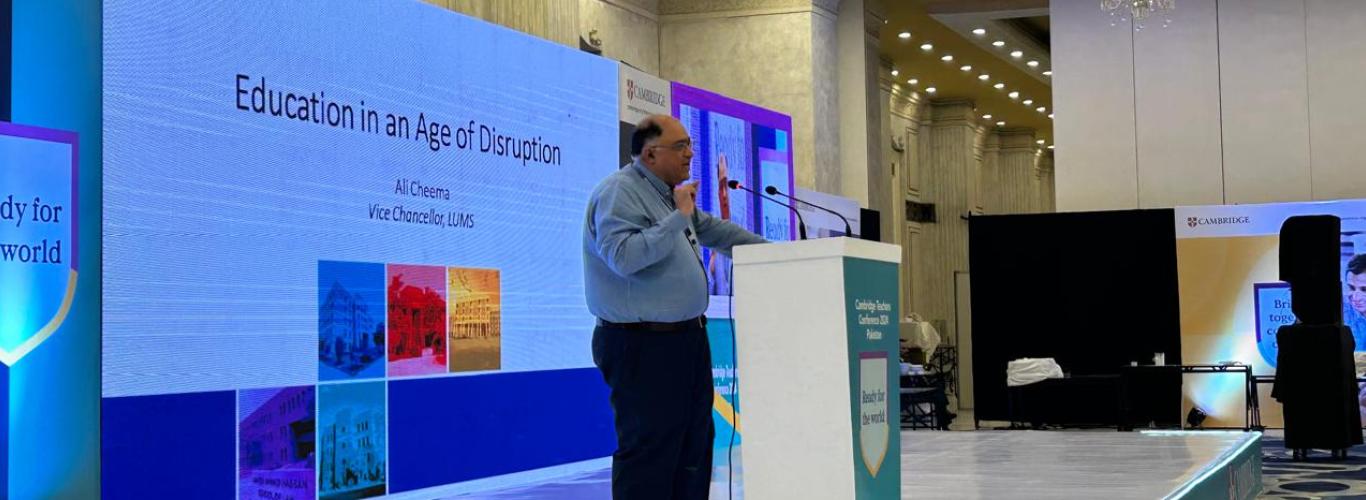Cambridge Teachers Conference 2024: Finding Educational Balance in a Changing World
The Cambridge Teachers Conference 2024, titled ‘Finding Educational Balance in a Changing World’, convened at the Pearl Continental Lahore on June 26, bringing together educators from diverse backgrounds to address pressing issues in today’s educational landscape. Organised by the Cambridge International Examinations, the conference was a pivotal platform for discussing the future of education in light of technological advancements and societal changes.
A highlight of the event was the keynote speech delivered by Dr. Ali Cheema, Vice Chancellor of LUMS, who provided an overview of the challenges and opportunities facing education today. Dr. Cheema emphasised the crucial role of educators in shaping the future of Pakistan and beyond, acknowledging the profound responsibility teachers hold in moulding young minds. “I want to thank CIE for giving me this opportunity. It is an incredible honour to talk to schoolteachers and leaders who are going to be central in determining the future of Pakistan,” remarked Dr. Cheema, acknowledging the influential role of educators in policy and practice.
Dr. Cheema was joined by Dr. Simon Child, Head of Assessment Training, and Carolyn Tiller, Director of Qualifications and Test Development, both from Cambridge University Press & Assessment. Their contributions enriched the discussions, which covered a wide range of topics including educational reform, evolving assessment methodologies, and the transformative impact of digital technology and artificial intelligence on traditional educational paradigms.
Dr. Cheema focused on the theme of education in the age of disruption, highlighting how the post-industrial evolution era has accelerated the pace of change, significantly impacting jobs and education. He emphasised the need to understand the future challenges and disruptions in education and what educators should be doing to address them in Pakistan.
One point of discussion was the paradoxical nature of artificial intelligence. Dr. Cheema remarked, “AI is one of the biggest ironies. You are going to use this to solve your learning problems, yet in doing so, it might deskill you for the labour market. This irony needs our attention.” This highlights the dual-edged nature of AI as both a tool for advancement and a potential disrupter of skill acquisition.
He also explored the issue of skill disruption and uncertain future of job markets as technology continues to evolve. Dr. Cheema connected these themes to the rising anxiety levels among today’s youth, which have been notably increasing since 2010. He referenced Jonathon Haidt’s insights from his book, “The Anxious Generation,” discussing the decline of play-based childhoods and the overprotective tendencies of modern parenting. Haidt argues that this overprotection in the real world, coupled with the rise of phone-based childhoods resulting in under protection in the virtual world, has led to a generation struggling with attention spans and the ability to engage with longer, more complex content. Dr. Cheema echoed these concerns, stating, “On the one hand, you have huge exposure to virtual technologies which has a big effect on people’s bandwidth. But on the other hand, socialisation, such as how do you play together? How do you work together? Those types of models are being dismembered both by the education system and by the scheduling that’s happening in families. We think that this is natural, but it is not. We are creating this world actively as adults and need to rethink it.”
Inclusivity was a central theme, advocating for educational systems that support diverse learning needs, including disabilities. Gender disparities in STEM fields were also critiqued, with a call to challenge societal norms influencing career choices.
A recurring emphasis was on nurturing critical and analytical skills alongside technical proficiency. Dr. Cheema highlighted the imbalance: conventional education often excels in technical training but underemphasises humanistic thinking and creativity. He stressed the pivotal role of schools and education in preparing students for the future job market, calling for proactive alignment with global economic demands.
Dr. Cheema offered several key suggestions for reimagining the future of education. He advocated for a curriculum that integrates critical reasoning, ethics, and humanistic inquiry. He proposed rewiring childhoods by mainstreaming creative arts and play to foster a more well-rounded development. He also recommended leveraging technology to create customised learning paths and assessments tailored to individual student needs. Dr. Cheema also emphasised the need to flip the classroom model to build skills for self-learning and independent research. He asserted that achieving these goals requires collaborative efforts among schools, universities, and examination boards.























